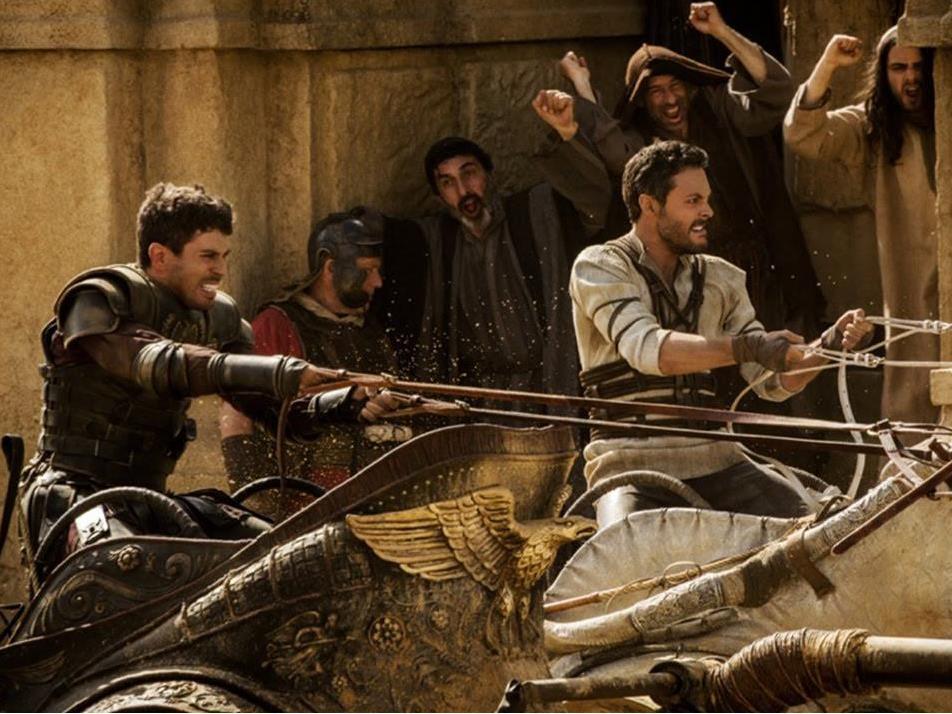Ben-Hur photograph via Paramount Pictures.
For more than half a century, films thought sizeable in scope, running time, budget or awards prospects have been touted as bigger than Ben-Hur, the Oscar-winning 1959 religious epic with Charlton Heston in the titular role; however the same won’t be said about the latest version to reach screens. The fifth movie adaptation of Lew Wallace’s influential 1880 Christian book Ben-Hur: A Tale of the Christ – including a silent short and feature, as well as a 2003 animated take voiced and produced by Heston – aims to condense the story but retain the spectacle of its most famous precursor, and falls markedly short.
Indeed, for many modern moviegoers, the Heston-starring Ben-Hur is best known for its impressive chariot race, which spanned nine minutes and still ranks among one of the most thrilling and tense sequences in cinema history. Endeavouring to recreate this iconic scene with contemporary technology is just one of the areas in which director Timur Bekmambetov (Abraham Lincoln: Vampire Hunter) struggles. While the mechanics and narrative motivation remain, gone is any urgency in a jumble of computer-generated effects, GoPro-shot footage and over-eager cutting.
The arena duel between the eponymous Judah Ben-Hur (Jack Huston, Pride and Prejudice and Zombies) and his adopted brother turned Roman army officer Messala (Toby Kebbell, Warcraft) provides the climax of the film, though – knowing that’s what most audiences will be waiting for – that doesn’t stop Bekmambetov from referencing it right from the outset. From there, Ben-Hur jumps back eight years to find its protagonist happy as a Jewish prince in Jerusalem during the time of Jesus (Rodrigo Santoro, Jane Got a Gun), and palling around with his kindly pseudo-sibling.
Alas, Messala feels like an outsider among his family, and opts for military service to try to forge his own identity. Upon his return, their reunion is short-lived due to an incident between a zealot and Pontius Pilate (Pilou Asbæk, A War). Eager to demonstrate his allegiance to the Romans, the dutiful tribune brands his brother a traitor, sentencing him to years of sea-faring slavery. With Judah’s wife (Nazanin Boniadi, TV’s Homeland) forced into hiding, and his mother (Ayelet Zurer, Daredevil) and sister (Sofia Black-D’Elia, Project Almanac) condemned, he plots a quest for chariot-fuelled revenge, as aided by the wealthy Sheik Ilderim (Morgan Freeman, Now You See Me 2).
Writers Keith R. Clarke (The Way Back) and John Ridley (American Crime) might prove competent enough in whittling down the lengthy tale to a more manageable 125 minutes, but thanks to Bekmambetov’s inability to balance action with emotion, the end result of their efforts never convinces. Their clunky dialogue doesn’t help; however when their director isn’t ensuring that cinematographer Oliver Wood’s (Grimsby) images rarely remain static, he’s tasking editors Dody Dorn (Fury), Richard Francis-Bruce (Truth) and Bob Murawski (Poltergeist) with matching the feature’s many erratic splices to its visuals. In fact, the movie’s two standout moments almost defy his flashy but messy proclivities. A ship battle gives a glimpse of the kind of immediacy other segments could’ve benefited from, while a later show of faith and forgiveness is suitably tender.
Just as Bekmambetov can’t wrangle the story into a palatable feature, neither can his largely under-used actors. Huston offers a more grounded, less righteous take on his iconic lead role than his predecessor that suits the material’s musings on toiling to survive and stay human amidst harshness and oppression, though it’s his scenes with Kebbell that showcase his skills and serve the movie best. Accordingly, a film that ultimately strives to shift focus to the importance of absolution and redemption rather than chart a mission of vengeance doesn’t earn much of either — or, despite its chaotic aesthetics, interest. A grand tale, the underlying narrative may be; a grand cinema event, Ben-Hur circa 2016 definitely isn’t.
Rating: 2 stars out of 5
Ben-Hur
Director: Timur Bekmambetov
USA, 2016, 125 mins
Release date: August 25
Distributor: Paramount
Rated: M
Actors:
Director:
Format:
Country:
Release:





